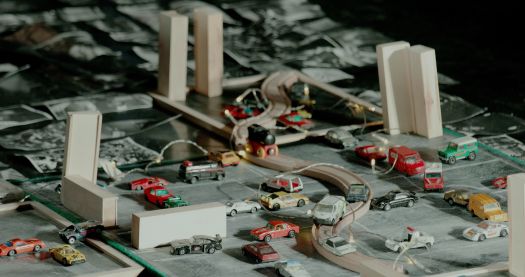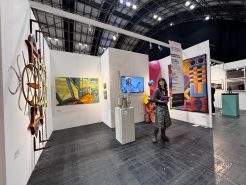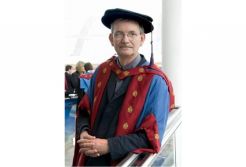Professor of Theatre leads immersive show at Future Flares Festival as part of performance research
5 February 2025
Dr Michael Pinchbeck recently led an immersive performance together with Ollie Smith as part of Future Flares Festival.
The performance titled ‘A Seventh Man’ was inspired by the highly influential 1975 book of the same name about migration by John Berger and Jean Mohr. In this piece created by Pinchbeck and Smith, the pair suggest that Berger and Mohr’s book has grown more relevant today than ever.
Talking on his connection to the ‘A Seventh Man’ book, Michael Pinchbeck said: “I had already been invited to adapt A Fortunate Man by John Berger and Jean Mohr in 2018 by the Nottingham-based theatre company, New Perspectives. After that project, I approached Ollie Smith about adapting A Seventh Man in 2020 to adapt the second book Berger and Mohr collaborated on. Arts Council England helped fund that 2020 project. I then went onto adapt Another Way of Telling, their third and final book together, in 2023 to create a trilogy of shows. We were interested in adapting the book as migration is a timely and topical theme. The book was written in 1975, 50 years ago, but as Berger said ‘It can happen that a book, unlike its authors, grows younger as the years pass’. The show also talks about how Berger said how of all his books this is the one of which he was most proud so there’s something important about us introducing it to new generations of readers”.
The narrative of ‘A Seventh Man’ follows workers leaving home, crossing borders and facing questions about the work they do and taking medical tests to see if they are fit enough. Three performers quote directly from the book as if both narrating and acting out its portraits of a generation of young men who travel across a continent in search of a better life. Part slideshow, part documentary, part adaptation, the piece explored / exploded the book to mark its 50th anniversary.
Pinchbeck and Smith felt that this mix of different mediums was vital in presenting their work: “The book is a fascinating collision of text and images that depict the migrant experience at that time and was quite radical when it was published in 1975 both in its content and style. In fact, it was quite challenging for the publishers to print it with the visual layouts Berger and Mohr wanted as it takes a collage approach to showing how migrant workers lived and worked. As such, we had to use non-traditional approach to adapt the book and have used images both through video and slideshow, and by literally bringing photographs into the performance -for example, you are given a photo of someone when you arrive which is like your passport. Verbatim interviews were used, both with the voice of Berger and migrant workers and immigration officers in 1975, and with contemporary interviews with one of the performers’ fathers talking about coming over to the UK from Tunisia. By using these interviews, we are comparing then and now and also bringing the book into focus for the 21st century audience”.
Michael Pinchbeck is part of the Performance Research Group at Manchester Met, a group Influencing creative developments, public policy and broader culture through impactful performance research. ‘A Seventh Man’ was an important part of this research as Michael Pinchbeck explains: “Myself and Frances Babbage have written an article about the performance for Arts journal, ‘Acts of Unsettling: An Immersive Adaptation of Berger and Mohr’s A Seventh Man’, looking specifically at how the site-specific approach enables us to stage and destabilise the text. We also address the fact that we change the text to the second person, you, instead of the third person, ‘he’, to invite the audience into the experience. We have also challenged the male-orientated nature of the text by working with three female performers, one of whom brought their own lived experience of migration into the devising process. Frances Babbage and I are now working on a new book for Intellect called Ways of Staging: The Berger and Mohr Trilogy, which will comprise the three play texts of the shows devised and critical writing about the work”.
This performance was part of a wider festival programme at Future Flares Festival that included with a curated selection of innovative, politically engaged performances, plus related talks and workshops. This year’s line-up featured work from radical performance makers including ‘Get Off’, an ‘in yer face’ look at desire by Katy Baird, the ecological and devastating ‘Vigil’ by Mechanimal/Tom Bailey, and a thrilling new ‘30 min set’ by Lewys Holt, alongside pieces by other leading artists/researchers based at Manchester Met including Dan Dubowitz, Andrea Maciel and the festival organiser, Neil Mackenzie.
Michael Pinchbeck commented that the festival was a really useful platform for showcasing the work due to the collaborative nature and open feedback that the festival offers: “When we made A Seventh Man originally it was a site-specific performance in a shed for an audience of 10 people. We later toured it to Cologne and showed it in a shed there. For Future Flares, we wanted to stage it in a studio to a larger audience and explore the option to have a studio version and a site-specific version. It was a useful learning curve, and we received some very positive feedback from the audience as well as documentation of the show which we will use for future touring. We also wanted to stage it again to mark its 50th anniversary this year. It is good to show work-in-progress within a festival context where you can receive feedback. I have shown work at three previous Future Flares Festivals and it’s a great staging post for new ideas. I would like to thank Neil Mackenzie, Future Flares team and the Performance Research Group”.
A Seventh Man is directed by Michael Pinchbeck and Ollie Smith. Devised and performed by Gabrielle Benna, Olwen Davies and Hayley Doherty.
Find out more about the Performance Research Group at Manchester Met.



